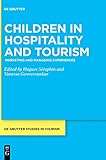Children in Hospitality and Tourism : Marketing and Managing Experiences / ed. by Hugues Séraphin, Vanessa Gowreesunkar.
Material type: TextSeries: De Gruyter Studies in Tourism ; 4Publisher: München ; Wien : De Gruyter Oldenbourg, [2020]Copyright date: ©2020Description: 1 online resource (VIII, 181 p.)Content type:
TextSeries: De Gruyter Studies in Tourism ; 4Publisher: München ; Wien : De Gruyter Oldenbourg, [2020]Copyright date: ©2020Description: 1 online resource (VIII, 181 p.)Content type: - 9783110644586
- 9783110644678
- 9783110648416
- 338.4791 23
- G155.A1
- online - DeGruyter
- Issued also in print.
| Item type | Current library | Call number | URL | Status | Notes | Barcode | |
|---|---|---|---|---|---|---|---|
 eBook
eBook
|
Biblioteca "Angelicum" Pont. Univ. S.Tommaso d'Aquino Nuvola online | online - DeGruyter (Browse shelf(Opens below)) | Online access | Not for loan (Accesso limitato) | Accesso per gli utenti autorizzati / Access for authorized users | (dgr)9783110648416 |
Frontmatter -- Acknowledgements -- Contents -- 1. Introduction -- 2. Beyond KidZania: A new framework for identifying the potential impacts of resort mini-clubs -- 3. “Adult only” hotels: Why are children excluded? -- 4. Resort mini-clubs as tools for the long-term improvement of negative destination image -- 5. World schooling: An emerging form of tourism -- 6. Good holidays in children’s voices and drawings -- 7. ReesLeisure and Winchester May Day Triathlon for Children -- 8. Kid-friendly digital communication for hotels and service adaptation: Empirical evidence from family hotels -- 9. Making memories: An empirical study of children’s enduring loyalty to holiday places -- 10. The role of children in marketing, a state of the art: Applications in tourism marketing -- 11. Conclusion -- Contributors -- List of figures -- List of tables
restricted access online access with authorization star
http://purl.org/coar/access_right/c_16ec
This book works to fill a serious gap in tourism and hospitality research – children as future consumers. For decades, researchers and industry practitioners alike have overlooked and undervalued the significance of children’s perspectives and their influence as decision-makers. However, the United Nations Convention on the Rights of the Child (1989) emphasizes that children have the right to participate in matters that affect them. With this in mind, the contributors to this edited collection draw attention to children as thinkers, actors and transformers of the future of the tourism and hospitality industry. Through a mix of conceptual and empirical chapters, the book collectively supports an overarching theme: the empowerment of children as present and future consumers should be a core component of any sustainable tourism initiative. Towards this goal, the chapters herein represent internationally diverse perspectives and offer a number of innovative recommendations to the industry’s practitioners.
Issued also in print.
Mode of access: Internet via World Wide Web.
In English.
Description based on online resource; title from PDF title page (publisher's Web site, viewed 28. Feb 2023)


